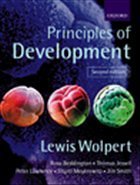e have resisted the temptation to cover every aspect of development and have, instead, focused on those systems that best illuminate common principles. Indeed a theme that runs throughout the book is that universal principles govern the process of development.' (Lewis Wolpert, Introduction) Principles of Development is designed for undergraduates. The emphasis is on principles and key concepts. Central to the authors' approach is that development can best be understood by understanding how genes control cell behaviour. They have assumed that students have some basic familiarity with cell biology and genetics, but all key concepts, like the control of gene activity, are explained in the text, and an extensive glossary is provided too. The authors have resisted the temptation to cover every aspect of development and have instead focused on those systems that best illuminate common principles. Indeed, a theme that runs throughout the book is that there are universal principles governing development. At all stages what they have included has been guided by what they believe undergraduates should know about development. The focus of the text is on vertebrates and Drosophila, but not to the exclusion of other systems, such as the nematode and the sea urchin, where they best illustrate a concept. An important feature of the book is the inclusion of the development of plants, which is usually neglected in other textbooks, but has some unique and important features. Principles are presented as clearly as possible and numerous summaries are provided, both in words and in pictures. The illustrations in the book are a special feature, and have been carefully designed and chosen to illustrate both experiments and mechanisms. SUPPORTING MATERIAL Web site www.oup.com/wolpert - sample chapter (Sept 01) - illustrations available for downloading (Dec 01) - review questions for each chapter (Dec 01) - course/lecture outlines for each chapter (Dec 01) Lab manual by Gibbs - a book that covers laboratory techniques NEW TO THIS EDITION (for more detail see web site www.oup.com/wolpert) Updated throughout with the very latest research. Includes 32 completely new figures. Improved text design makes the book easier to read. Chapter 3 is now clearer on the comparative basis of body axis specification in vertebrates. Chapter 4 contains a longer and improved explanation of somite generation and differentiation. A reorganized Chapter 9 deals with the relationship of gene expression to cell differentiation in a more simplified way. There is an important addition of material highlighting functional differentiation of a range of new vertebrate tissues and structures in Chapter10 (the vertebrate heart and vascular system, lung and tooth, with skin development moved forward from Chapter 14), whilst more is included on arthropod neuroblast and compound eye development in Chapter 11. In the final chapter, new pages are added to support the section on phylogeny and functional morphogenesis in evolution, including storylines on snakes and kiwis. There is also a discussion on variable growth rates in homologous structures and the evolution of the gastrula. This is all material which increases the book's ability to enthuse students about the relationships of development to evolution - something which really does get them going!
Review quote:
"This book is, by far, the best introductory textbook in existence for an interesting but complex subject." Journal of Cell Science 115, 2002
A new edition of Principles of Development, the authoritative undergraduate textbook on developmental biology. Written by a team of distinguished authors, led by Lewis Wolpert, one of the most influential developmental biologists of our time, the text focuses on principles and key concepts to guide students through this fascinating but often challenging subject. Those universal principles governing development in vertebrates, invertebrates, and plants are explained in a lively and engaging way, through both words and pictures.
Review quote:
"This book is, by far, the best introductory textbook in existence for an interesting but complex subject." Journal of Cell Science 115, 2002
A new edition of Principles of Development, the authoritative undergraduate textbook on developmental biology. Written by a team of distinguished authors, led by Lewis Wolpert, one of the most influential developmental biologists of our time, the text focuses on principles and key concepts to guide students through this fascinating but often challenging subject. Those universal principles governing development in vertebrates, invertebrates, and plants are explained in a lively and engaging way, through both words and pictures.

